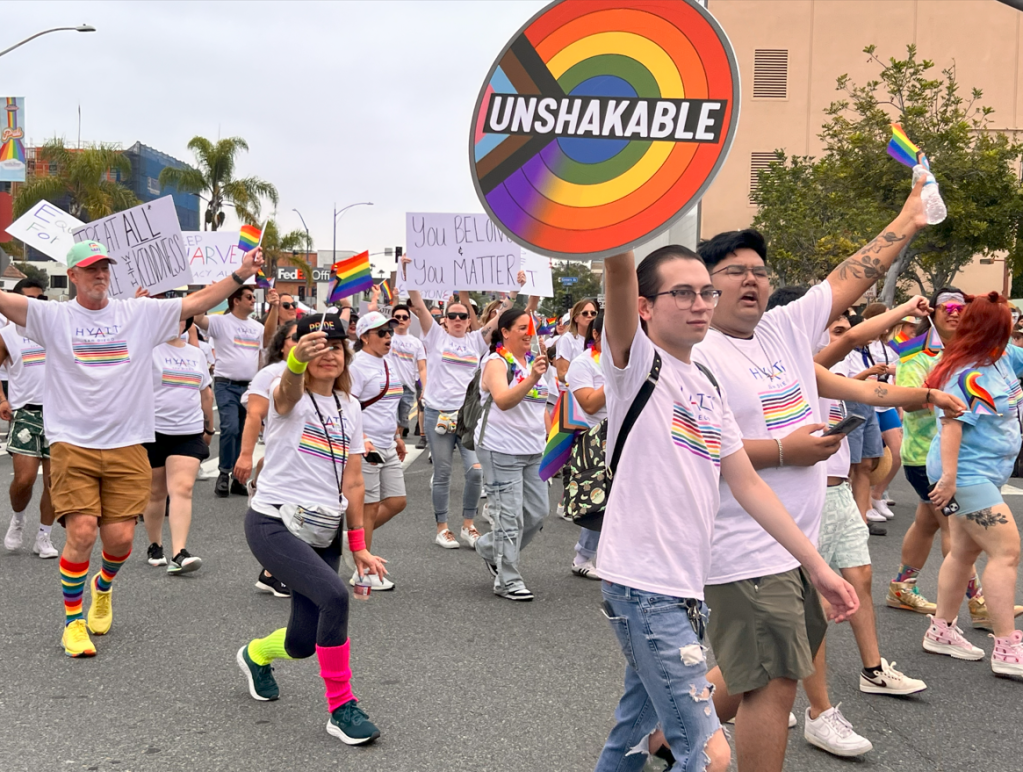At a time when anti-LGBTQ+ rhetoric and policies are intensifying nationwide, San Diego’s LGBTQ+ leaders have reiterated that strength comes from community.
For the nonprofit that leads the city’s marquee LGBTQ+ celebration, that sense of community has stood on shaky ground recently, between controversy over the festival’s headliner and public concerns from other key LGBTQ+ leaders over the organization’s leadership and direction.
Colorful floats blasting music and carrying teams of people made their way down University and 6th avenues on Saturday, with crowds of thousands of people lining the streets cheering them on. And while many parade participants were in it for all fun, dancing and singing, many others carried signs nodding to the current political atmosphere and Trump administration.
Members of SPARTA Pride, a national organization that advocates for transgender service members, helped lead the parade after the parade’s signature motorcycle legion.
Several local officials participated in the parade, including council member Stephen Whitburn, Mayor Todd Gloria and assembly member Chris Ward — all of whom have said they are not attending the Pride festival this year due to concerns over its headlining performer Kehlani.
Parade attendee Adeline Colton, 22, has been coming to the parade since she was 15. She first came with her dad, who she said has been a huge supporter of hers for years. This year, she and her friend Lake Parr stood watch on 6th Avenue.
Parr typically walks in the parade with local groups, but this year opted to watch. The two said that this year, the energy at the parade feels more connected.
“It feels more together this year, different from other years,” Colton said. “Maybe it’s the presidency, but I feel like everyone is really showing up, like everyone in the community. The energy is great.”
Around a quarter of a million people typically attend San Diego’s annual Pride parade, the largest single-day civic event in the region.
“We really are in this all together,” San Diego Pride’s interim executive director Kristin Flickinger said earlier this week. “We are under attack from our government, and that’s not going to end anytime soon.”
In the last six months, the Trump administration has repeatedly targeted LGBTQ+ people and the policies that protect them, recently ending funding for a hotline for LGBTQ+ youth and barring transgender people from serving in the military.
It has also moved to erase recognitions of LGBTQ+ history, including by removing the name of gay sailor and rights activist Harvey Milk from a Navy ship and by stripping mention of transgender people from the website of Stonewall National Monument, where the LGBTQ+ rights movement began in earnest.
Nationwide, there are currently close to 600 pieces of anti-LGBTQ+ legislation, according to the American Civil Liberties Union.
And while reports of hate crimes overall fell in San Diego last year, according to police, those involving bias against sexual orientation made up 40% of all those reports — up from the year before.
Some LGBTQ+ leaders raised concerns in recent months that San Diego Pride isn’t adequately supporting the community against the litany of attacks and that its year round programming seems unstable.
“There’s a lack of clarity of what is the mission of Pride,” one former volunteer told The San Diego Union-Tribune last month.
Pride events are held today in San Diego to honor the Stonewall uprisings of 1969, when police raided the Stonewall Inn in New York City and patrons fought back in a days-long confrontation.
San Diego Pride’s own origins date back to 1974, when a group of people took to San Diego’s streets calling for gay rights. In subsequent years, the group grew, and the modest march became the Pride Parade, which now brings in about 250,000 people each year.
San Diego Pride, as a nonprofit, has grown to offer year-round programming and adopt an ethos of “Pride 365” — though to some that ethos feels uncertain now.
Last month, a group of LGBTQ+ leaders called for reforms over transparency and communication at San Diego Pride in a letter to the nonprofit.
It came weeks after dozens of Jewish organizations said they wouldn’t participate in Pride events this year, citing concerns about Kehlani’s remarks on Israel and about Jewish attendees’ safety.
Over recent months, several other organizations and local leaders also decided to not participate in the parade due to the singer’s scheduled performance.
Kehlani has publicly expressed support for Palestinians in Israel’s war against Hamas in Gaza and has been accused of promoting antisemitic rhetoric on social media and in their music. The singer has said they are “not antisemitic nor anti-Jew” but are “anti-genocide.”
An event called J-Pride is being held on Saturday as an alternative to the Pride festival this year.
San Diego Pride says it has lost sponsors and funding for its events this year due in part to the Kehlani controversy and in part to a national shift away from diversity, equity and inclusion prompted by Trump.
But ticket sales to the festival are way up this year, which Flickinger hopes will help offset the loss.
Originally Published: July 19, 2025 at 11:58 AM PDT
